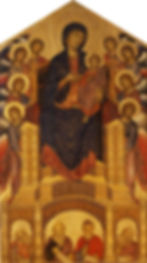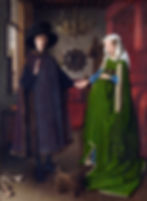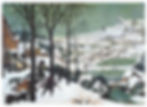Kuntz
AP Art History
AP
Part 1: LATE MEDIEVAL PAINTING









APAH 250 Images:
CONTENT: What do you see?
FORM: The details (what you see more exactly). How the artist delivers the content.
CONTEXT: Everything NOT observable.
FUNCTION: The intended purpose of the work.
Assignments:
READINGS: Stockstad, Chapter 18,
pgs 536-548
UNIT SHEET: below
Q CARDS: Images displayed
SNAPSHOT Sheet:
Late Medieval Painting Unit Sheet
Late Medieval Painting
63. Arena (Scrovegni) Chapel,
including Lamentation
64. Golden Haggadah
* Madonna Enthroned, Cimabue
* Madonna Enthroned, Giotto
* Virgin and Child Enthroned, Duccio
Part 1: Late Medieval Painting Unit Sheet

Part 2: NORTHERN RENAISSANCE ART








CONTENT: What do you see?
FORM: The details (what you see more exactly). How the artist delivers the content.
CONTEXT: Everything NOT observable.
FUNCTION: The intended purpose of the work.
Assignments:
READINGS: Stockstad, Chapters 19 + 22 (various sections)
UNIT SHEET: below
Q CARDS: Images displayed
SNAPSHOT Sheet:
Northern Renaissance Unit Sheet
APAH 250 Images:
Part 2: Northern Renaissance Unit Sheet
66. Annunciation Triptych (Merode Altarpiece)
68. The Arnolfini Portrait, Jan van Eyck
77. Isenheim Altarpiece, Matthias Grünewald
74. Adam and Eve, Albrecht Dürer
79. Allegory of Law and Grace,
Lucas Cranach the Elder
83. Hunters in the Snow, Pieter Bruegel the Elder
* Garden of Earthly Delights, Hieronymus Bosch

Part 3: FLORENTINE RENAISSANCE ART









CONTENT: What do you see?
FORM: The details (what you see more exactly). How the artist delivers the content.
CONTEXT: Everything NOT observable.
FUNCTION: The intended purpose of the work.
Assignments:
READINGS: Stockstad, Chapter 20
UNIT SHEET: below
Q CARDS: Images displayed
SNAPSHOT Sheet:
Florentine Renaissance Unit Sheet
APAH 250 Images:
Part3: Florentine Renaissance Unit Sheet
* Brancacci Chapel –
Masaccio’s Holy Trinity/Tribute Money
71. Madonna and Child with Two Angels,
Fra Filippo Lippi
72. Birth of Venus, Sandro Botticelli
* Christ Delivering the Keys to the Kingdom,
Perugino
* Florence Cathedral, Baptistry Doors, Ghiberti
69. David, Donatello and St. Mark
67. Pazzi Chapel, Filipo Brunellschi
70. Palazzo Rucellai, Leon Battista Alberti

Part 4: HIGH, LATE, VENETIAN RENAISSANCE









CONTENT: What do you see?
FORM: The details (what you see more exactly). How the artist delivers the content.
CONTEXT: Everything NOT observable.
FUNCTION: The intended purpose of the work.
Assignments:
READINGS: Stockstad, Chapter 21
UNIT SHEET: below
Q CARDS: Images displayed
SNAPSHOT Sheet:
High/Late/Venetian Renaissance Unit Sheet
APAH 250 Images:
High Renaissance:
73. Last Supper, Leonardo da Vinci
* Mona Lisa, Leonardo da Vinci
76. School of Athens, Raphael
75. Sistine Chapel ceiling and altar wall
frescos, Michelangelo
* Michelangelo: David, Pieta, Moses, Bound
Slaves
* Bramante: tempieto, Plan for St. Peter’s
* Raphael’s cycle of paintings Stanza della
Segnatura
Late + Venetian Renaissance:
80. Venus of Urbino, Titian
* Villa Rotunda, Palladio
* Last Supper, Tintoretto
* Feast in the House of Levi, Veronese
Key Ideas- High Renaissance
(1495-1520)
-
Revitalization of the city of Rome under Pope Julius II
-
All about Roman Grandeur by producing awe inspiring artistic projects
-
Key Points: Symmetry, Balance, Ideal Proportions, Triangular compositions
-
Venetian Painters stress sensuous forms with sophisticated color combos
-
Portraits are of true likeness and personalities
-
Renaissance = Before sack of Rome
-
Mannerism = After 1527
Part 4: High, Late, Venetian Renaissance Unit Sheet

Part 5: MANNERISM


CONTENT: What do you see?
FORM: The details (what you see more exactly). How the artist delivers the content.
CONTEXT: Everything NOT observable.
FUNCTION: The intended purpose of the work.
Assignments:
READINGS: Stockstad, Chapter 21, pgs 661-668
UNIT SHEET: below
Q CARDS: Images displayed
SNAPSHOT Sheet:
Mannerism Unit Sheet
APAH 250 Images:
78. Entombment of Christ, Jacobo da Pontormo
* Burial of Count Orgaz, El Greco
Key Ideas- Mannerism (1520-1600)
-
Mannerist art is deliberately intellectual, asking the viewer to respond in a sophisticated way to the spatial challenges
-
Complicated compositions, distorted figures, complex allegorical interpretations
Part 5: Mannerism Unit Sheet
